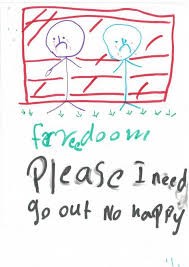
Preserving the rights of Children in detention
It is well accepted within international law that children, given their inherent vulnerability and lack of self-reliance, require special protection.
Of the various international instruments which are concerned with protecting child welfare, none is more fundamental than the United Nations Convention on the Rights of the Child (CROC).
The CROC entrenches a number of rights relating to the treatment, education and basic needs of children, which all signatories are obliged to uphold.
Whilst Australia is a signatory to this convention, its commitment to subjecting child asylum seekers to mandatory detention casts serious doubt to its ability to meet its international obligations. This is because mandatory detention essentially puts the lives of those children on hold.
It should be emphasised that as a signatory to the CROC, Australia is obliged to uphold the rights of all children within its jurisdiction. As such, Australia maintains an obligation to preserve the rights of children in detention.
Children in mandatory detention: Violation of the CROC
The Australian Human Rights Commission has emphasised how subjecting children to mandatory detention is clearly in violation of the CROC. In particular, it breaches Article 16(1), which provides that no child shall be subjected to arbitrary or unlawful interference with his or her privacy, family, home or correspondence, nor to unlawful attacks on his or her honour and reputation.
Additionally, the current state of the detention centres also breaches Article 34, which provides that parties to the convention must undertake to protect children from all forms of sexual exploitation and sexual abuse.
The inherent tragedy of these circumstances when one recognises that out of the total number of children being held in detention, 153 are babies, 204 are pre-schoolers (aged 2 to 4 years old), and 336 primary school aged children. In addition, 128 children have been born in detention.
Migration Law Framework affecting refugee rights

However the problem goes far beyond the conditions found within migration detention centres. Instead, this can be regarded as an issue relating to the nature of Australia’s migration law framework.
When one considers the centrepiece of Australia’s migration legislation, the Migration Act 1958 (Cth) (Migration Act), along with its legislation surrounding child refugees, Immigration (Guardianship Children) Act 1946 (Cth) (IGOC), one notices that one necessarily contradicts the other.
The central problem is the conflict between the Immigration Minister’s under s 6 the IGOC Act and the Minister’s duties under the complicated matrix of the Migration Act.
Whilst under the former, the Minister retains a “responsibility as guardian” in relation to unaccompanied/separated minors, he is also required to act as their “prosecutor, judge and gaoler” under the latter.
This conflict creates significant ambiguity in relation to the rights of child asylum seekers.
Scholars have noted that the central emphasis of the Migration Act is the protection of Australia’s borders, rather than the preservation of refugee rights.
For instance, recent amendments to the Migration Act ensure that asylum seekers that arrive without adequate documentation in Australia’s states and territories have been ‘excised from the migration zone and are prohibited from applying for protection visas in Australia.
According to Mark Evenhuis, the disproportionate emphasis placed on border protection (as opposed to child or refugee rights) ‘underpins an expansive concept of persecution’ in Australian migration law.
In conclusion, it is evident that Australia’s current legislative framework surrounding asylum seekers does not accord with international law.
In failing to do so, children seeking asylum are placed in a position where they are subject to mistreatment and abuse. Ideally, Australian migration law should reflect the notion that all people have a right to seek asylum and abolish the practice of mandatory detention.
However at the very least, there must be a change to ensure that Australia’s deterrent measures towards refugees and asylum seekers do not ‘override the needs of the embodied child.’
As such, amendments could be made to ensure that child refugees are provided with adequate care and protection as they attempt to seek refuge in Australia. Such change is justified on humanitarian and ethical grounds, as well as on the basis of international law.
Ariza Arif


